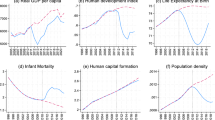Abstract
This paper focuses on Belarus in order to find explanation as to why Alexander Lukashenko was able remain the authoritarian leader of Belarus, while in Ukraine the position of the political elite had proved less stable and collapsed in 2004. We seek to determine whether the internal factors (macroeconomic conditions, standard of living, the oppressive nature of the political system) play a significant role in the operation of the domino effect. This article emphasises the determining role of immanent internal factors, thus the political stability in Belarus can be explained by the role of the suppressing political regime, the hindrance of democratic rights and the relatively good living conditions that followed the transformational recession. Whilst in Ukraine, the markedly different circumstances brought forth the success of the Orange Revolution.
Similar content being viewed by others
Author information
Authors and Affiliations
Corresponding authors
About this article
Cite this article
Mészáros, Á., Szabó, Z. Designed for Patience: The Significance of Internal Factors in the Ukrainian and Belarusian Transitions. Transition Stud Rev 14, 313–330 (2007). https://doi.org/10.1007/s11300-007-0149-9
Issue Date:
DOI: https://doi.org/10.1007/s11300-007-0149-9




